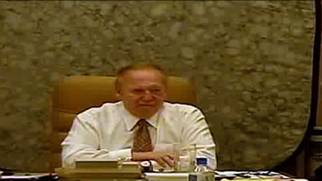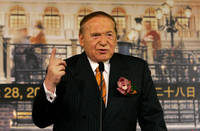Sheldon Adelson 2006 lawsuit deposition

Viewing video requires the latest version of Adobe's Flash Player
Las Vegas attorney Donald Campbell says this video from a deposition in 2006 disproves allegations that he lost his temper and tried to throw books at Las Vegas Sands Corp. Chairman and CEO Sheldon Adelson.
A judge has rejected a request by billionaire Sheldon Adelson that a Las Vegas law firm be punished over the public broadcasting of an Adelson deposition video.
In a dispute with First Amendment implications, Clark County District Court Judge Kenneth Cory on Friday rejected the request that punishment in the form of a contempt of court finding be imposed against the law firm Campbell & Williams.
Adelson sought the punishment after that firm last year filed as a public court exhibit excerpts from a 2006 deposition that attorney Donald Campbell had conducted of Adelson.
The excerpt was lodged in a 2011 federal overtime lawsuit filed by a former Adelson driver against Adelson and two of his companies.
The deposition was taken in another suit filed in state court in 2006 that was later settled.
Campbell said the excerpts were filed to disprove allegations in the 2011 case by one of Adelson's companies, casino resort operator Las Vegas Sands Corp., that Adelson had to summon an armed security officer to the 2006 deposition after Campbell lost his temper and attempted to throw books at Adelson.
That claim was made in a company statement to the Las Vegas Sun and VEGAS INC.
The book-throwing claim came up as Las Vegas Sands and Campbell fought over the location of a planned deposition in the 2011 case.
Attorneys for Adelson said it appeared that besides publicly filing the deposition video, Campbell's office had provided it the same day to television station KLAS-TV, which aired it right away. Adelson's attorneys said this appeared to be an effort to humiliate Adelson, though it was never proven how KLAS obtained its copy of the DVD court exhibit.
U.S. District Judge Robert C. Jones, who is presiding over the still-pending overtime case involving the former Adelson driver, in October said he lacked jurisdiction to consider Adelson's motion that Campbell and his firm be found in contempt. Jones said
Adelson and his companies would have to take the issue up with the state court where the 2006 suit was litigated.
Before Friday's state court ruling, U.S. Magistrate Judge Carl Hoffman commented in the overtime case that the video ''directly contradicts the claims by the Las Vegas Sands spokesman and clearly supports the facts as posted by plaintiff's counsel (Campbell).''
Campbell & Williams has said the video shows the Adelson parties "purposefully smeared Mr. Campbell's personal and professional reputation by disseminating lies to the news media.''
Cory, the state judge in the 2006 case, suggested in his order Friday that Las Vegas Sands invited Campbell to defend himself against the company's allegation he had lost his temper and tried to throw books at Adelson.
''Any potential interest (Adelson) maintained in protecting confidential information obtained by plaintiff (in the 2006 lawsuit) through videotaped depositions or by other means from being released to the public at large was greatly diminished by the act of issuing a public press release which interjects the same matter to which a right of privacy is now invoked into the public sphere,'' said the order signed by Cory. "Where the one claiming to have fallen victim to invasion of their privacy takes occasion to publicly accuse opposing counsel of bullying tactics, an accusation for which a federal judge has found no support, the court finds it difficult to see the necessity of invoking the court's supervisory powers over the litigation process.''
The video shows the security officer joined the deposition after disputes erupted between Adelson and Campbell.
The video shows the disputes escalated when Adelson had an aide put a stack of books on a table in front of Campbell, that Campbell wasn't interested in them and put them on the floor, that Adelson directed Campbell to pick them up and that Campbell refused.
The driver's overtime lawsuit against Adelson isn't the only case where the potential public airing of Adelson deposition videos has come up.
It's also an issue in the high-profile lawsuit filed against Las Vegas Sands and subsidiary Sands China Ltd. by Sands' fired Macau CEO Steven Jacobs.
Attorneys for Jacobs claim he was wrongly fired and is owed back pay. Sands says he was fired for cause.
During a hearing last month on what information obtained through discovery would potentially become part of the public court record, attorneys for Jacobs said they should have the opportunity to make public video deposition excerpts if they're criticized by Las Vegas Sands in the way Campbell was criticized.
Todd Bice of the law firm Pisanelli Bice PLLC, representing Jacobs, said the Las Vegas Sands statement accusing Campbell of "unethical behavior'' was "exposed as a complete farce by the video.''
''I have no intention, and neither does my team have any intention, of using any videotape, putting it up on YouTube or doing anything of the like,'' Bice said. ''But they can rest assured that if my name gets slandered or any of my colleagues get slandered like happened with respect to Mr. Campbell, we are going to defend ourselves.''
But attorney J. Stephen Peek, of the law firm Holland & Hart representing Las Vegas Sands and Sands China, said the U.S. Supreme Court has ruled "a deposition and discovery are not a public process'' and that there's no right of the public to see deposition videos.
Peek asked Clark County District Court Judge Elizabeth Gonzalez to establish protections so Jacobs' legal team ''just don't willy-nilly go out there and put out a videotape of a deposition of any one of our witnesses, not just Mr. Adelson, but anybody who's going to be deposed.''
He disputed the notion that "there is a righty of the public to these depositions or a right to defend yourself in the court of public opinion because of some belief that there is going to be some statement issued about Mr. Jacobs based upon what they say happened in another case.''
Gonzalez said that with video depositions, just as with deposition transcripts that may end up in the public court record, the parties can designate certain sections to be "confidential'' or "highly confidential.''
''I understand that depositions are private among the parties, they're not subject to the public being involved, but the restriction of a party's ability to release that information that is not confidential or highly confidential is in my mind inappropriate,'' Gonzalez said during the hearing, citing the First Amendment rights of the parties to distribute nonconfidential information.
